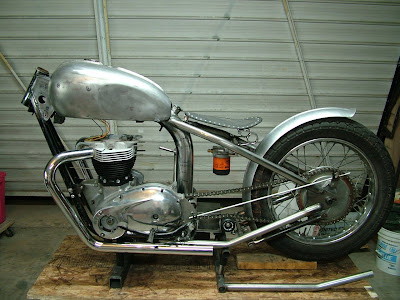 I have spent nearly the last decade of my life as a student of ceramics, sculpture, and art history. Add that to some engineering, plenty of time in construction as well as building cars and bikes, and this background on me might explain a bit of what will be a long discourse on how I think and relate elements of art and design to my motorcycles. With my motorcycles, in no way do I think I am inventing the wheel. Rather, I feel that I am improving on a preexisting design in a way that best suits my personal aesthetic, as well as my idea of how things should function. I am trying to detail a series of processes and thought patterns that are nearly second nature to me, but also have a history, rationale, and most times, a precedent.
I have spent nearly the last decade of my life as a student of ceramics, sculpture, and art history. Add that to some engineering, plenty of time in construction as well as building cars and bikes, and this background on me might explain a bit of what will be a long discourse on how I think and relate elements of art and design to my motorcycles. With my motorcycles, in no way do I think I am inventing the wheel. Rather, I feel that I am improving on a preexisting design in a way that best suits my personal aesthetic, as well as my idea of how things should function. I am trying to detail a series of processes and thought patterns that are nearly second nature to me, but also have a history, rationale, and most times, a precedent.When it comes to ceramics and sculpture, the focus is relatively simple: a form comprised of elegant lines that showcases whatever it is I am trying to say, whether it be a bowl, ceramic gas tank, or mixed media sculpture. It needs to show a feeling, whether attempting to capture speed and grace, display power in a form, or simply show itself by being there. Art is meant to display some of its artist and elicit reaction in its viewers.
Engineering, on the other hand, is what I think of as problem solving. I need a table in my garage. It needs to be strong, cheap, and easy to build. Do I care if the end result is pretty or elegant? Not in the least. So my tables are constructed of two by fours and MDF, held together with wood screws and diagonal supports. Here is a construct with brute form dictated by engineering, time constraints, and economics; regardless of how ugly it is, the table supports the weight of multiple engines, is the perfect working height, and cost seven bucks.
To me, design is the marriage of the art and engineering, to make a form that has a specific function. It should be an elegant and practical solution that also happens to be quite beautiful. A good example is my motor mount plates. They must securely hold the motor, while having a nice curve, and must account for the differences in a now hard tailed frame (see the post for more details). When it comes to building and designing motorcycles, it is an endless series of such designs and decisions.
I think that this process is exactly what makes cars, motorcycles, and other things that go fast so interesting. It is the combination of performance, speed, and beauty. The end result is arresting when done well, and hideous when done poorly. And, that being said, its a deeply personal decision. When I think of great classic cars or bikes, the whole is always greater than the sum of its parts. Each piece equally contributes to the overall aesthetic, without overshadowing other parts, and the whole should look effortless, as if popped into being from ether.










